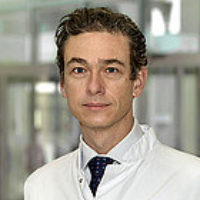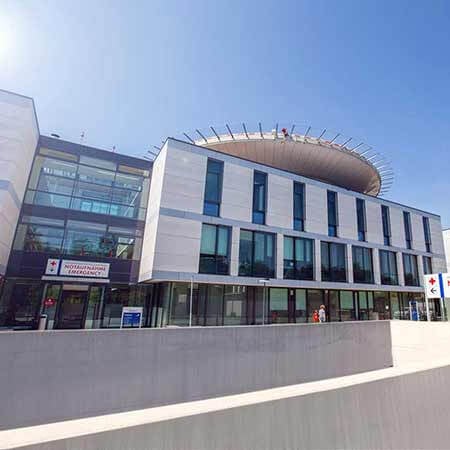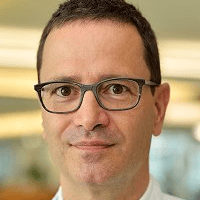Surgical Removal of the Tumor for Glioblastoma (brain Cancer) in the Best Hospitals in the World
Treatment prices are regulated by national law of the corresponding countries, but can also include additional hospital coefficients. In order to receive the individual cost calculation, please send us the request and medical records.

Department of Adult and Pediatric Neurosurgery, Spinal Surgery
The Department of Adult and Pediatric Neurosurgery, Spinal Surgery offers all the possibilities of modern surgical treatment for diseases of the central and peripheral nervous system in patients of all ages. More than 6,000 surgical procedures are performed annually in the department's high-tech operating rooms. Both planned and emergency neurosurgical procedures are performed here. The department's surgical team focuses on patients with cerebrovascular diseases, brain and skull base tumors, spine and spinal cord diseases, cerebrospinal fluid circulation disorders, and pathologies of the peripheral nervous system. The department's team of physicians also has extensive experience in functional neurosurgery: specialists perform deep brain stimulation for movement disorders, spinal cord stimulation for back pain, and vagus nerve stimulation for epilepsy. The department works closely with neurologists, radiologists, and nuclear medicine specialists to provide patients with the highest level of comprehensive medical care. The department is recognized as one of the top neurosurgical centers in Germany and beyond, as evidenced by consistently high treatment success rates and numerous quality certifications, including the German Cancer Society (DKG) Certificate, the German Spine Society (DWG) Certificate, and the Leading Medicine Guide Certificate.







Department of Neurosurgery and Spinal Surgery
The Department of Neurosurgery and Spinal Surgery offers the full range of modern surgical procedures for patients with diseases of the brain, spinal cord, spine, and peripheral nervous system. The department has state-of-the-art equipment, including navigation systems, monitoring devices, surgical microscopes, intraoperative X-ray diagnostic systems, angiography systems, and laser equipment. In addition, a system for minimally invasive stereotactic interventions has been installed in the department's operating room. The department's neurosurgeons use the latest microsurgical and endoscopic techniques in their work. The medical facility is one of only three in Europe to successfully use the VISUALASE™ device for MRI-guided laser ablation to treat epilepsy. This minimally invasive procedure is highly effective and represents a real breakthrough in epilepsy surgery. The department's neurosurgeons always strive to provide the patient with optimal medical care. They talk in detail about each stage of treatment and are happy to answer the patient's questions. Neurologists and specialists in the field of neuroradiology are often involved in the therapeutic process, which guarantees a comprehensive approach to treatment.


Department of Adult and Pediatric Neurosurgery
The Department of Adult and Pediatric Neurosurgery offers the full range of surgical treatment of diseases of the brain, spine, spinal cord and nerves in adults and children. The department keeps pace with new trends in medicine, as well as contributes significantly to their development. Therefore, the most modern diagnostic and therapeutic methods are available here. An individual approach to each clinical case is crucial to ensure optimal treatment results with the preservation of all neurological functions.

Glioblastoma is one of the most common types of malignant brain tumors, it accounts for more than 50% of neoplasms found in the brain. This tumor is the most aggressive of all malignant brain tumors.
Content
- What is glioblastoma?
- Symptoms of glioblastoma
- Diagnostics
- Treatment options
- Cost of treatment
- Where can I undergo the treatment of glioblastoma?
- How can I undergo glioblastoma treatment abroad?
What is glioblastoma?
There are different types of brain tumors, including benign and malignant ones.
Up to 80% of malignant brain tumors develop from glial cells of the brain tissue, and therefore they are called gliomas.
Glioblastoma is a glioma that is considered one of the most dangerous malignant brain tumors.
As already mentioned, it develops from brain cells that play a supporting and auxiliary role in the growth and development of nervous system cells. Therefore, these tumors can occur in different parts of the brain, which, of course, complicates their diagnosis and treatment.
Symptoms of glioblastoma
The development of glioblastoma causes various symptoms, which largely depend on the location of the brain tumor. However, the symptoms that are the most common in cancerous brain tumors, including glioblastoma are:
- Headaches
- Nausea
- Dizziness
- Convulsive seizures
- Impaired motor and cognitive abilities
Diagnostics
To detect glioblastoma in time, it is necessary to undergo a preventive medical examination.
If a person is concerned about having a malignant brain tumor, he can go through a diagnostic program to reveal the signs of the disease and receive recommendations for the treatment.
For this, the most advanced methods are used, including:
- Computed tomography (CT). Computed tomography is a type of X-ray scan, in which a computer is used to produce images of the internal structures of the brain.
- Magnetic resonance imaging (MRI). Magnetic resonance imaging is a type of diagnostics that uses electromagnetic waves to visualize the internal structures of the brain.
- Functional MRI. Functional MRI is a method that allows doctors to examine the blood flow inside tumors and obtain detailed information about the brain tumor and the functioning of the nearby healthy tissues.
- Magnetic resonance spectroscopy. Magnetic resonance spectroscopy is a method for determining the metabolic rate in brain tissue.
- Electroencephalography (EEG). EEG is a method that records the electrical activity of the brain by measuring electrical potentials.
- Brain biopsy. Brain biopsy involves taking a sample of brain tissue for histological examination.
- Lumbar puncture. It involves taking a small amount of cerebrospinal fluid for examination.
- Positron emission tomography (PET) and single-photon emission tomography (SPECT). Those methods determine the level of tissue functional activity.
Treatment options
As it has been already mentioned, glioblastomas are considered one of the most aggressive brain tumors. Therefore, if identified, it is necessary to start treatment immediately.
Removal of such tumors is especially difficult as they often arise in hard-to-reach regions and do not have a defined shape as their boundaries are blurred.
Most often, combined methods are used to treat glioblastomas. They are removed surgically, if the case allows. After that, radiotherapy and chemotherapy are prescribed, and if necessary, additional surgeries are performed to remove the brain tumor, as often glioblastomas continue developing even after the first removal.
- Surgery.
Surgery for glioblastoma is a complex procedure. Before the surgery, patients undergo extensive diagnostics, during which the volume and the boundaries of the brain tumor are determined.
The surgery is performed under anesthesia, due to which a patient does not experience any discomfort while being fully conscious. With low electrical discharge, neurosurgeons stimulate various parts of the brain, while talking to the patient and controlling his sensations. If during the stimulation some brain functions are disturbed, for example, sight or speech, then these areas are not subjected to manipulations during surgery to avoid severe consequences of treatment and a patients’ disability.
The surgery is carried out using microsurgical instruments, under the computer system control. The neurosurgeons coordinate every movement precisely, controlling them not only with the help of the operating room technical equipment but also directly communicating with the patient to identify possible discomfort.
- Radiation therapy.
Studies show that radiation therapy almost doubles the life expectancy for patients with glioblastoma. Additionally, patients receive chemotherapy and other treatments. If it is impossible to remove the brain tumor with surgery, radiation therapy can be used.
Radiation therapy for glioblastoma of the brain is carried out using the latest equipment. Irradiation is performed on the ultra-modern linear accelerators TrueBeam and Novalis, with which doctors target precisely only the areas of the brain affected by the tumor. Radiation therapy for glioblastoma is often a supportive treatment that is combined with neurosurgery or chemotherapy.
Due to the wave effect of radiation therapy, doctors manage to reduce the number of abnormal cells in the patients’ brain tissues, partially reduce the tumor in size and start the process of necrosis of the neoplasm tissues. As a rule, radiation therapy is the most effective in complex treatment.
- Chemotherapy.
Treatment of glioblastoma with a group of cytostatic drugs has a complex effect on the patient's body and prevents further development of the tumor. The dosage of drugs, the number of courses, and the group of necessary medications are selected strictly individually, considering the characteristics of the current disease and the patients’ physical condition. This prevents most of the severe side effects and other complications associated with classical chemotherapy.
Chemotherapy is also one of the stages in the complex treatment of a brain tumor. The other ones include surgery and radiation therapy.
- Clinical trials.
Clinical trials offer patients with glioblastoma a unique possibility to increase the range of the available treatment options. Once a promising new therapy is developed, it is compared to the current standard of care in the clinical trials.
If the novel therapy outperforms the existing one, it may eventually become the new standard of care However, until then patients will only be able to receive innovative treatment in a clinical trial.
Through past clinical trials for glioblastoma, patients have been able to benefit from:
- Chemotherapy drugs that are especially effective for brain tumors that cannot be removed surgically
- Medications that block the formation of new blood vessels that promote brain tumor growth
- Alternative chemotherapy delivery cycles to slow the process of long-term disease progression
- Oxygen therapy to enhance the effects of traditional chemotherapy and radiation therapy
- Other clinical trials that focus on quality-of-life factors
Considering the limitations of current glioblastoma treatments, clinical trials have been proven to be very valuable for patients who feel restricted by the standard options. Because the cancer is fast-spreading and can be resistant to standard therapies, many patients want to participate in clinical trials as a way of taking a more proactive and hopeful approach.
Cost of treatment
The cost of treatment in the best hospitals on the Booking Health website is relatively low. As a rule, you can save up to 40% of the initial price by booking the medical program here.
With Booking Health, you can undergo the treatment of glioblastoma at an affordable price. The cost of treatment varies in different countries, as the prices depend on the hospital, the clinical diagnosis, and the complexity of treatment. The cost of treatment abroad goes as follows:
- Germany – from 21,298 EUR to 37,282 EUR
- Spain – about 12,713 EUR
- Austria – about 26,650 EUR
- Turkey – about 12,656 EUR
- Israel – about 22,200 EUR
You can visit the Booking Health website to find out the exact price for your treatment type.
Where can I undergo the treatment of glioblastoma?
The best hospitals for the treatment of glioblastoma are:
- University Hospital Bergmannsheil Bochum, Germany
- Charite University Hospital Berlin, Germany
- University Hospital HM Monteprincipe Madrid, Spain
- Beta Klinik Bonn, Germany
- University Hospital for Neurosurgery Salzburg, Austria
You can check out the full list of specialized hospitals on the Booking Health website.
How can I undergo glioblastoma treatment abroad?
Organizing the treatment of glioblastoma abroad by oneself can be challenging. It is safer, easier, and less stressful to shift some responsibility onto a medical tourism agency that will support you throughout your journey.
We will help to find the right medical institution for you. It is practically impossible to do this on your own, as it requires specific knowledge and experience in medical tourism. It is in our power to do everything to make the treatment as comfortable as possible.
If you want to get more information on the right hospital for your diagnosis or the cost of treatment, please leave a request on the Booking Health website. We will contact you as soon as possible, and answer all your questions.
Authors:
The article was edited by medical experts, board-certified doctors Dr. Nadezhda Ivanisova and Dr. Vadim Zhiliuk. For the treatment of the conditions referred to in the article, you must consult a doctor; the information in the article is not intended for self-medication!
Sources:

